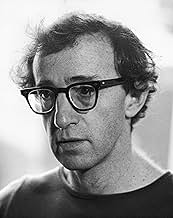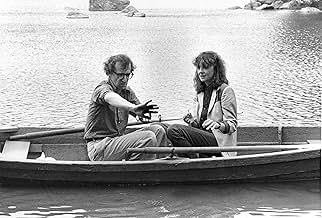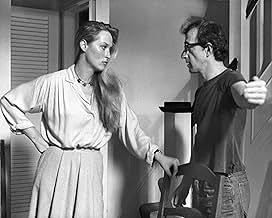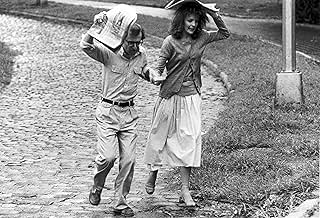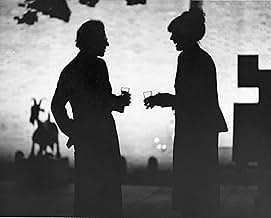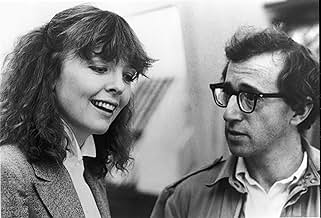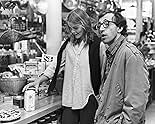A vida de um roteirista de televisão divorciado que namora uma adolescente se complica ainda mais quando ele se apaixona pela amante de seu melhor amigo.A vida de um roteirista de televisão divorciado que namora uma adolescente se complica ainda mais quando ele se apaixona pela amante de seu melhor amigo.A vida de um roteirista de televisão divorciado que namora uma adolescente se complica ainda mais quando ele se apaixona pela amante de seu melhor amigo.
- Direção
- Roteiristas
- Artistas
- Indicado a 2 Oscars
- 16 vitórias e 24 indicações no total
- Emily
- (as Anne Byrne)
- Direção
- Roteiristas
- Elenco e equipe completos
- Produção, bilheteria e muito mais no IMDbPro
Avaliações em destaque
I can see why people love this film, it certainly is quite original and a convincing snapshot of a group of friends in New York, but I found Woody's character just too excruciating self-possessed and irritating to enjoy the film overall.
I guess you either love him or hate him, but he reminded me of George Costanza on Seinfeld - i just wanted to shake him and say 'get over yourself!'.
As for the humor, there were a lot of attempted wit there but nothing that made me laugh out loud. I won't be a hurry to see any of his other films.
'Manhattan' is even better than the great 'Annie Hall'. The black and white cinematograpy, done with a good reason, gives a little extra to the movie. Like I said Streep is terrific and so are Allen, Keaton and especially Hemingway (she was nominated for an Oscar). The monologues Allen had in 'Annie Hall' are still present, smart, interesting and funny. A great story, very intelligent, of course written (and directed) by Woody Allen himself.
Allen is so brainy and such a nebbish that he can get away with gestures that would be painfully sentimental in the hands of any other director: when he begins the movie with fireworks cut to Gershwin, it isn't to soften you up for a soap opera, but to remind you that however much his neuroses may seem to drive the scenes, its the love of New York that drives the movie.
The entire cast is note perfect: Meryl Streep as his caustic bisexual ex-wife, Diane Keaton as a nervous journalist from Philadelphia, and especially Mariel Hemingway, whose performance as Allen's 17-year old girlfriend is charming, heartbreaking, and wise.
Allen's comedy here is at its absolute finest. The fact that it is interwoven with a genuinely moving love story told with a subtlety and indirection that is unheard of in today's mainstream cinema only makes the laughs that much richer.
Gordon Willis' cinematography is good enough for the Museum of Modern Art. Scene after scene leaves a grin on your face as his moving (in both senses) black and white photography floats across the screen.
And finally underlying everything is the music of George Gershwin, whose exubertant melodies propel the movie forward at every turn.
This is Woody Allen's best movie, a great movie, and an American movie in the best sense. As an homage to the city of New York it will surely remain unsurpassed.
That this is such a gorgeous film may strike those following the formulaic, Hollywood approach to cinema as strange and heretical. The story is unexciting (restless male in love triangle), most of the characters are unsympathetic, at least on the surface (particularly Isaac), Allen leaves lose ends lying around all over the place, and there's certainly no action (unless you count the car-chase-without-a-chase-scene involving Diane Keaton, Woody Allen and a VW Beetle).
So why should any self-respecting member of the MTV generation spend time on this film? Well, here are a few reasons.
The script is wit of the highest order. This is not gag-a-minute humour like Friends, but an altogether more acute art form stemming from character, some wonderful dialogue and a fair amount of darkness (I love the bit about Isaac trying to run over his ex-wife's lover). Allen is also prepared to turn his biting satire to personal issues, such as being Jewish. Just don't expect someone to look shrug their shoulders, slap their forehead and with mid-rising intonation say d'uh! It's not that kind of comedy.
Then there is the gorgeous cinematography. Woody loves Manhattan and you can certainly tell. If there is one criticism of the film, it is that it leaves a rather picture postcard impression of the city, but I suppose if it's love, then it's love. Much of the film appears to have been shot at either sunrise or sunset to soften the light, and there are spectacular views of the towers, bridges and waterways of America's finest metropolis.
Then, I suppose, there is the fact that Manhattan is probably the archetypal Woody Allen film. Other films may be better, like Annie Hall or Hannah and Her Sisters but, in Manhattan, all the elements of Allen's style are in perfect balance. There's the jazz, the neurotic, unsympathetic lead, the choice between stable and highly-strung women, the self-mocking humour (hilariously done in the opening voice-over), the railing against intellectual snobbery, the deep unease with popular culture.
And there are great performances. Allen is at his most difficult and in some ways his least likable. As Isaac, he's trying to do the right thing, but is rarely selfless enough to follow through with it. Diane Keaton is great as Mary, the lynchpin between the two love triangles vain, pretentious and yet you can see why Isaac falls for her. Well, all the actors are great, and very believable, but special mention must go to Meryl Streep, who manages to steal the show with her tiny cameo as Isaac's ex-wife, writing a book about their break-up and living with their son and her lover. She is magnificent.
Of course, the film will also do nothing to dispel the popular rumour that New Yorkers are neurotic, self-obsessed and self-indulgent at least that narrow social circle Allen so often writes about. If you don't mind that, though (and I'm English, so what do I care) you're in for a treat. As with the city itself, the memories of this film will stay with you forever.
Você sabia?
- CuriosidadesMeryl Streep shot her scenes during breaks in filming Kramer vs. Kramer (1979).
- Erros de gravaçãoIn the first scene at Elaine's, as Isaac is beginning to say something, two people (presumably customers of the restaurant, as it was running while they were shooting) walk in front of the camera. Isaac laughs, and quickly recovers with an impromptu remark about how his girlfriend has to go and do homework.
- Citações
Isaac Davis: All the times I come over here, I can't understand how you can prefer her to me.
Jill: You can't understand that?
Isaac Davis: No. It's a mystery to me.
Jill: Well, you knew my history when you married me.
Isaac Davis: I know. My analyst warned me, but you were so beautiful that I got another analyst.
- Cenas durante ou pós-créditosOne of the very few Woody Allen films to not have traditional opening credits, save the production company bumper (United Artists), and the film title MANHATTAN is seen as a long vertical flashing bright neon sign, located on the side of a New York City building, and is seen for under seven seconds just before Woody Allen narrates his first line.
- ConexõesEdited into Intimate Portrait: Diane Keaton (2001)
- Trilhas sonorasRhapsody in Blue
(1924)
Music by George Gershwin
Performed by The New York Philharmonic
Conducted by Zubin Mehta
Piano soloist: Paul Jacobs
Music director: Zubin Mehta
Principais escolhas
Detalhes
- Data de lançamento
- País de origem
- Idioma
- Também conhecido como
- Chuyện Tình Manhattan
- Locações de filme
- Empresa de produção
- Consulte mais créditos da empresa na IMDbPro
Bilheteria
- Orçamento
- US$ 9.000.000 (estimativa)
- Faturamento bruto nos EUA e Canadá
- US$ 39.946.780
- Fim de semana de estreia nos EUA e Canadá
- US$ 485.734
- 29 de abr. de 1979
- Faturamento bruto mundial
- US$ 40.194.067
- Tempo de duração
- 1 h 36 min(96 min)
- Cor
- Mixagem de som
- Proporção
- 2.39 : 1


